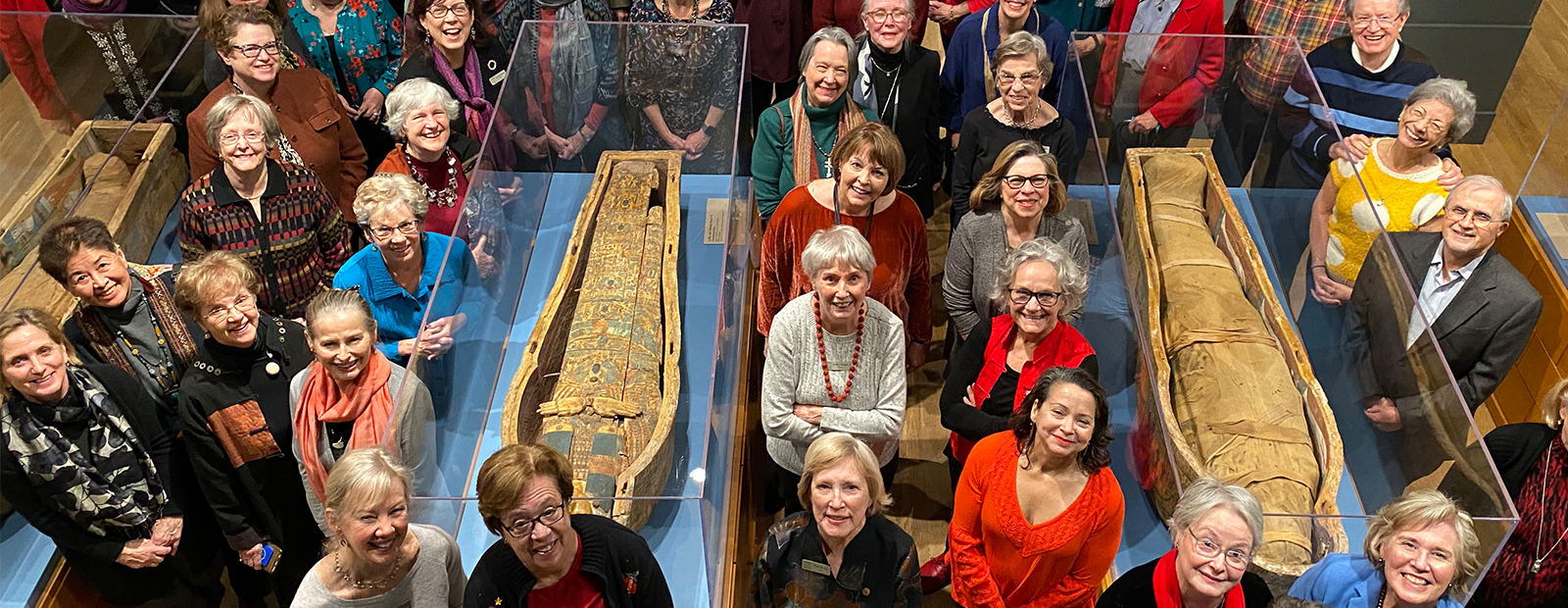Students on the Ars Longa, Vita Brevis Latin tour learn about Roman art, society, and mythology, and sometimes they practice translating the inscriptions that can be found in the galleries. Even the students just beginning their Latin studies understand enough to know that the people who lead the tours are called docents because in Latin, docent means “they teach.”
Docents do more than teach—they also learn (noscent). At the Carlos Museum, that learning process is more intensive than elsewhere, but docents needn’t have an art history background to participate. After an application process, new docents go through a nine-month training period that begins in August. During this time, they attend Emory’s Art History 101 course and weekly sessions with museum staff devoted to in-gallery pedagogy as well as the same training with faculty and curators that active docents attend.
In the spring, docents-in-training tour with a mentor whom they shadow and who is on hand when they begin giving their own tours for the first time. After they complete the training process, docents choose a day when they will be available to give tours.
Beyond touring, members of the Docent Guild can frequently be found attending or volunteering at museum programs. The close relationships they build with each other can also take them farther afield. Some Carlos docents travel abroad together to experience the cultures represented at the museum, sometimes just as tourists and other times as volunteers.
Beyond their teaching and learning, Carlos docents also give (donant) their time, enthusiasm, and more. When Julie Green, senior manager of educational programs, retired after 25 years of service, the docents commemorated her efforts with the purchase of a corn blossom marriage vessel by Native American artist Maria Tafoya.
It’s a tradition within the Carlos Docent Guild to honor the passing of friends and loved ones with a donation to the museum. When Wayne Bailey, a beloved longtime member of the Docent Guild, died in 2017, his friends at the museum made donations in his memory. His widow, Ellen, a member of Emory University’s Board of Trustees, made a gift, too. Together, these funds became the Wayne Bailey Docent Education Fund, which make it possible to bring distinguished speakers to the museum specifically for docent development and education.
In fall 2018, the Docent Guild welcomed Andrew Palamara of the Cincinnati Art Museum with support from the fund. Palamara spoke to the docents about their ability to empower visitors by creating an active learning experience that strengthens connections between objects and people.
In early 2020, author Rob Walker spoke to the Docent Guild about his book The Art of Noticing: 131 Ways to Spark Creativity, Find Inspiration, and Discover Joy in the Everyday. In his lecture, Walker prompted docents to reflect on their everyday surroundings and experiences and to consider how they can encourage creative observation in the galleries. In an e-newsletter sent shortly after his visit, Walker noted, “I was already a great fan of Emory and the Carlos (and its excellent bookshop!), but this was a really great audience.”
Since the museum’s closure due to COVID-19, the docents have stayed connected to the Carlos Museum and each other. They’ve been meeting via Zoom to continue to learn together through book discussions, working puzzles on Carlos from Home, and sharing favorite online resources.
“Our Docent Guild is incredibly special,” says Katie Ericson, Senior Manager of School and Volunteer Programs. “We are lucky to have so many volunteers that are so dedicated to the museum and passionate about our collection. Some of our docents have been with us more than 20 years—one has even been with us for 35 years! It’s amazing to see how excited they are to learn and share all they can with our guests. Their passion is so apparent, and it plays a huge part in their ability to inspire our guests to share their love for the museum! We miss seeing them every day, and we look forward to welcoming them back when we are able.”
This has been adapted from an article in the Spring 2019 newsletter.





